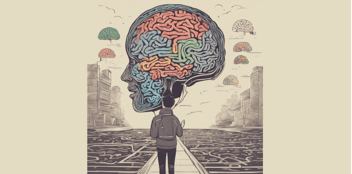Could artificial intelligence be the key to unlocking treatment-resistant depression?
- Home
- Blog

In the evolving landscape of healthcare, Artificial Intelligence (AI) is emerging as a powerful tool for diagnosing and treating complex medical conditions that have long perplexed even the most seasoned clinicians. Among these conditions, treatment-resistant depression (TRD) stands out as one of the most challenging. Despite numerous advances in psychiatric care, a significant subset of patients remains unresponsive to traditional treatments, leaving them in a state of chronic mental distress. However, AI is poised to change this narrative by offering new insights and personalized treatment strategies that were previously out of reach.
At Potomac Psychiatry, we practice what we call Root Cause Psychiatry™, deeply embedded within a Holistic Psychiatry framework. This approach goes beyond merely addressing symptoms; it seeks to uncover the underlying causes of mental illness by considering the patient as a whole person. Through the lens of Root Cause Psychiatry, we explore a wide array of factors that contribute to mental health, including genetics, cellular health, nutrition, the gut microbiome, and the immune system. Each of these elements plays a crucial role in either maintaining mental well-being or contributing to mental illness.
Genetics, for instance, can predispose individuals to certain psychiatric conditions by influencing neurotransmitter levels and brain function. Cellular health, which includes mitochondrial function and oxidative stress, is another critical factor, as it affects the overall vitality of neurons and other cells involved in brain function. Nutrition and the gut microbiome are inextricably linked to mental health, with emerging research highlighting the gut-brain axis as a key player in mood regulation and cognitive function. Lastly, the immune system's role in mental health cannot be overstated; chronic inflammation, autoimmunity, and infections can all trigger or exacerbate psychiatric symptoms.
In our practice, AI serves as an invaluable ally, analyzing vast amounts of data from these diverse domains to uncover patterns and suggest targeted interventions. By integrating AI into our Root Cause Psychiatry approach, through our own proprietary AI Agent, Dr. Holo™ (for “Holistic”), we are not only able to diagnose complex conditions more accurately but also to tailor treatments to the unique biological, psychological, and social factors affecting each patient.
Here is an example of an incredibly complex question I posed to Dr. Holo™ regarding a patient with a chronic treatment-resistant depression and multiple other medical conditions.


This initial answer was quite informative as I had not considered CBT-I nor yoga or acupuncture for this patient, which I plan to recommend at our next session. I also had some questions about whether some of the medications they had been placed on prior to seeing me could be causing problems, and so I asked Dr. Holo™ the following questions…

These answers gave me some ideas about how we might wean them off some of the medications prescribed by past psychiatrists. I then asked one further question as I had a hunch about how their hydroxyzine might be worsening her immune system problems…

Armed with these answers, I feel even more confident that by implementing some of these ideas I can further assist my patient in recovering from their treatment-resistant condition.
Concluding summary
In conclusion, AI is not just a technological advancement; it is a transformative tool that is reshaping the way we understand and treat mental health conditions like treatment-resistant depression. At Potomac Psychiatry, our commitment to Root Cause Psychiatry and a holistic approach allows us to harness the full potential of AI, providing our patients with the most personalized and effective care possible. As we continue to integrate AI into our practice, we look forward to unlocking new possibilities in the treatment of even the most stubborn cases of depression, offering hope where traditional methods have fallen short.
This blog underscores the potential of AI in transforming mental health care, particularly for those who have not found relief through conventional treatments. By sharing real-world examples and insights from our practice, we aim to inspire confidence in the future of psychiatric care—one where AI plays a central role in bringing about lasting mental wellness.
.png?width=144&height=144&name=Untitled%20design%20(34).png)

.png?width=352&name=Screenshot%202024-11-08%20at%2010.11.28%20AM%20(1).png)

